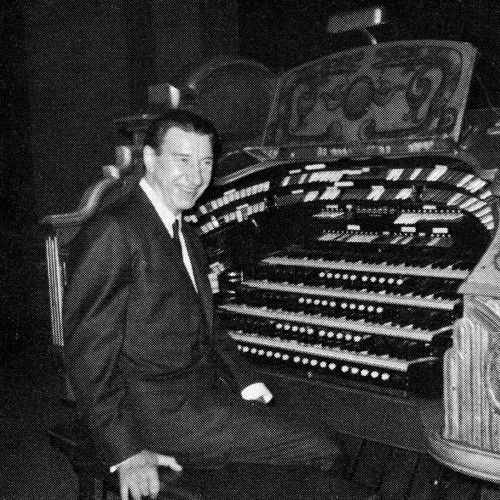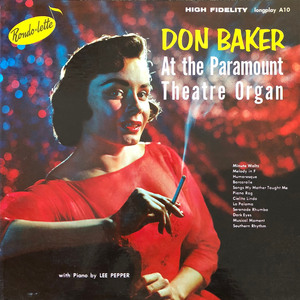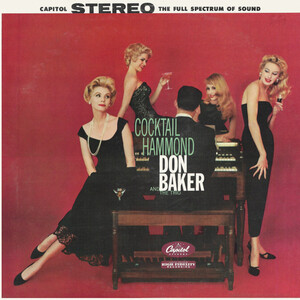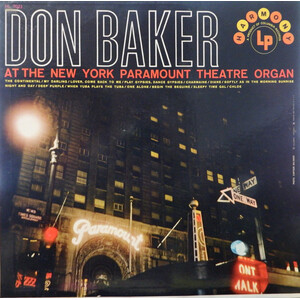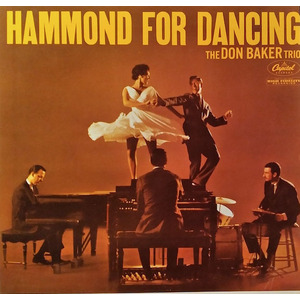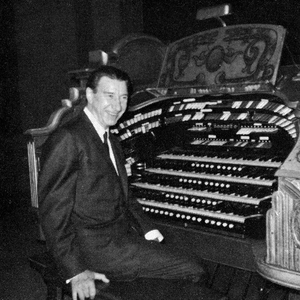Baker, Don
Websites:
No
Origin:
St. Thomas, Ontario, - Calgary, Alberta, 🇨🇦 - New York City, NY, 🇺🇸
Biography:
Don Baker: A Life in Music and Innovation
When discussing the legends of theatre organ music, one name continually rises above the rest—Don Baker. Known as "Mister Medley" and celebrated as "The Dean of the Theatre Organ," Baker's brilliance in the art of organ playing has left an indelible mark on the musical world. Born on February 26, 1903, in St. Thomas, Ontario, Canada, and passing on June 26, 1989, in Leesburg, Florida, his journey from a small-town prodigy to an internationally celebrated musician is a testament to his unmatched talent and dedication.
Early Life and Training
Baker's natural aptitude for music was evident early in his life. He began piano lessons at the age of 8 and later pursued formal studies at Mount Royal Conservatory in Calgary and the Toronto Conservatory of Music. With an exceptional ability to sight-read and improvise, Baker built a solid foundation that would later serve him well in his career as a theatre organist. His technique, characterized by agility, power, and a fluid sense of improvisation, enabled him to transition seamlessly from piano to the organ, a skill he famously taught himself.
Rise to Prominence
In 1923, Baker moved to New York City, taking his first theatre job as a pit pianist at the Flushing Theatre in Queens. It was here that he first encountered the organ, filling in for an absent organist. This serendipitous moment ignited a lifelong passion for the theatre organ. Recognizing his talent, he began practicing on the theatre's Wicks organ and quickly mastered its complexities, aided by his extensive musical training and keen ear for improvisation.
By the mid-1920s, Baker had secured positions at some of Manhattan’s most prestigious venues, including the Rialto and Rivoli Theatres. His virtuosity caught the attention of the Wurlitzer Music Store, where he was hired as a demonstrator and teacher.
In 1930, Baker became the house organist at the Staten Island Paramount Theatre, where he earned the title "Wizard of the Organ." His dynamic performances captivated audiences, blending intricate arrangements with an emotional depth that became his hallmark.
The Paramount Years and Beyond
In 1935, Baker was appointed as the solo organist at the legendary New York Paramount Theatre, a position he held for nearly 14 years. His performances often accompanied top big bands like Glenn Miller, Tommy Dorsey, and Benny Goodman, drawing audiences in droves. Baker's innovative arrangements, characterized by rapid tempo changes and elaborate ornamentation, set him apart as a master of the theatre organ.
During this time, he recorded extensively for Columbia Records and performed in short films produced by Paramount Pictures. His recordings showcased his ability to merge technical prowess with emotive storytelling, cementing his reputation as one of the greatest organists of his era.
International Recognition
Baker's talents were not confined to North America. In 1933, he toured England, performing at prestigious venues like the Granada Theatres in Tooting and Edmonton. His weekly broadcasts over the BBC introduced his music to a global audience, further enhancing his international acclaim.
Later Career
In 1948, Baker relocated to Las Vegas, where he performed at venues like the Last Frontier and Harrah’s Club in Lake Tahoe. During this time, he became a touring artist for the Conn Organ Company, giving concerts across the United States. He continued to record prolifically, releasing over 15 LPs and 50 singles that remain classics in the world of organ music.
In 1964, he returned to the New York Paramount Theatre for its final concert, a fitting tribute to the man who had brought so much life to its legendary Wurlitzer organ.
Legacy
Baker’s artistry extended beyond performance. He authored the book A Study in Theatre Organ Style, a definitive guide to the art of theatre organ playing. His work emphasized the importance of individual expression, improvisation, and the unique capabilities of the theatre organ.
Throughout his life, Baker was a pioneer who pushed the boundaries of what the organ could achieve. His performances were a masterclass in technique and emotional depth, inspiring generations of musicians to explore the possibilities of the instrument.
Baker passed away in 1989 in Leesburg, Florida, but his legacy lives on. In 1991, the Don Baker Memorial Wurlitzer was installed at Lake Brantley High School in Orlando, Florida, ensuring that his contributions to music would continue to inspire future generations.
Why Don Baker Matters
Don Baker’s life and career symbolize the golden era of theatre organ music. His ability to seamlessly blend technical mastery with emotional resonance set a standard that few have matched. Whether through his recordings, live performances, or educational contributions, Baker’s influence is felt wherever the theatre organ is celebrated.
With fewer than 600 original theatre organs remaining today, Baker’s work serves as a reminder of the artistry and innovation that defined a unique period in musical history. A true legend, Don Baker remains an enduring figure in the world of music, his name synonymous with greatness.
